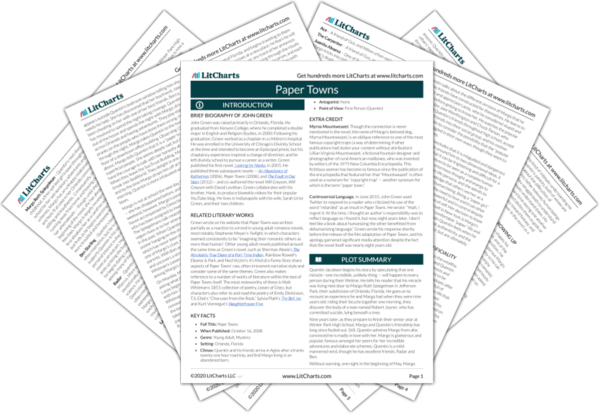Summary
Analysis
When they begin driving again, Margo directs Quentin to her friend Karin’s house, telling him how she verbally abused Karin after hearing her news about Jase. She leaves a bouquet of tulips and an apologetic note for Karin, and tells Quentin that their next task is to leave a fish for Jase. Since Jase’s family has an extremely sophisticated security system, Margo says she will handle things at his house. She remarks that she and Quentin “bring the fucking rain down on our enemies.” Quentin reminds her that they are punishing her enemies, not his. Margo answers this with a cryptic, “We’ll see.”
Margo is clearly an extremely impulsive person, who has no reservations about burning bridges with people she cares about; her harsh and unfair response to Karin illustrates this. She encourages Quentin to feel personally invested in their mission when she refers to “our” enemies. This is a hint that she might be planning something bigger than strict revenge. It also suggests she is invested in Quentin as an individual rather than simply a companion, and wants him to feel like an active participant in this adventure.
Themes
Quentin remarks that Jase’s subdivision, Casavilla, is full of “big, ugly homes for big, ugly people.” Parked outside Jase’s house, Margo writes Jase a note saying her love for him “sleeps with the fishes.” She tells Quentin to keep the car on and ready to drive. Wearing Jase’s baseball cap, Margo runs across the Worthington’s front lawn. The house lights up and sirens begin blaring. Quentin sits panicking in the car while Margo throws the fish through a window and sprays an “M” next to the shattered glass. Margo runs back to the car and they flee the scene, Margo cursing at Quentin when he slows for a stop sign.
Quentin reveals his own subtle distaste for the subdivisions of Orlando in his remark about Casavilla. He hasn’t expressed this kind of opinion before, and it seems as though Margo’s disdain for their world might be inspiring similar feelings in him. That Margo recycles the same note she used to disown Becca — the “sleeps with the fishes” message — makes her attack on Jase’s house seem less personal and emotional than her outburst in front of Becca’s house might suggest.
Themes
Margo admits that the escapade was intense even for her, but assures Quentin that the eighth part of their adventure will be easier. She explains that their next target is Lacey, who has been her friend since Kindergarten, but didn’t tell her about Jase and Becca. She goes on to claim that Lacey has been a terrible friend. Attempting to offer an example, Margo asks Quentin whether he thinks she’s fat, and says that Lacey often uses backhanded compliments to imply that this is the case.
Here, Margo shows herself to be vulnerable to bullying and insecure in much the same way that less socially successful people can be. Her popularity and good looks do not protect her from feeling victimized by other people. In fact, her position is even more painful than Quentin’s, since the people making her feel badly about herself are supposed to be her closest friends.
Themes
Quentin rushes to assure Margo that she shouldn’t lose any weight. He thinks at length about her unusual beauty, which seems to be inextricably intertwined with her personality. He claims that a statement about whether Margo was fat or skinny would be as absurd and meaningless as a statement about whether the Eiffel Tower was or was not lonely.
While Quentin’s comparison between Margo and the Eiffel Tower is supposed to be a flattering one—the tower is a tremendous work of art, after all —his professed inability to separate Margo’s personality from her body shows how his admiration of her originates in what is essentially a shallow crush. Quentin romanticizes the fact that he is physically attracted to Margo, and this makes it possible for him to convince himself that being attracted to her is the same as knowing and loving her on an essential level.
Themes
Get the entire Paper Towns LitChart as a printable PDF.

When they arrive at Lacey’s car, Margo jimmies the lock open. Quentin helps her hide a fish — which, like the other two, is accompanied by a “sleeps with the fishes” note —under the backseat, and doesn’t hesitate to spray an “M” on the car’s roof when she asks him to.
In agreeing without hesitation to paint Lacey’s car, Quentin throws himself more boldly into Margo’s plan than he has at any other point during the night. This task is less intense than the others, but his calm is nevertheless a sign that these experiences have helped ease some of his “childish” anxiety about breaking rules.
Themes
Back in the minivan, Quentin notices that using the spray paint can has left a blue spot on his finger. He shows Margo, who raises her own blue finger and touches it to Quentin’s. After a long time spent sitting that way, she tells Quentin to head downtown.
Agreeing to paint Lacey’s car is Quentin’s gesture of loyalty to Margo and solidarity with her, and also a sign that he is coming to understand her in a deeper way. Margo and Quentin are united at this moment as they have not been before.
Themes












